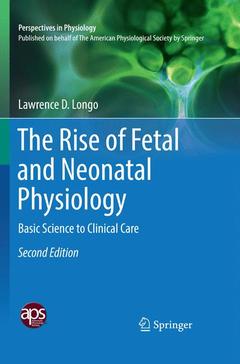Description
The Rise of Fetal and Neonatal Physiology (2nd Ed., Softcover reprint of the original 2nd ed. 2018)
Basic Science to Clinical Care
Perspectives in Physiology Series
Language: English
Subjects for The Rise of Fetal and Neonatal Physiology :
Keywords
Premature labor; Fetus; Neonatal; Newborn; Perinatal; Respiratory distress syndrome
Publication date: 03-2019
860 p. · 15.5x23.5 cm · Paperback
Publication date: 02-2018
Support: Print on demand
Description
/li>Contents
/li>Biography
/li>Comment
/li>
This second edition offers an expanded and updated history of the field of fetal and neonatal development, allowing readers to gain a comprehensive understanding of the biological aspects that contribute to the wellbeing or pathophysiology of newborns.
In this concluding opus of a long and prominent career as a clinical scientist, Dr. Longo has invited new contributions from noted colleagues with expertise in various fields to provide a historical perspective on the impact of how modern concepts emerged in the field of fetal physiology and contributed to the current attention paid to the fetal origins of diseases in adults. In addition to new chapters on maternal physiology and complications during pregnancy, others trace the history of the Society for Reproductive Investigation, governmental funding of perinatal research, and major initiatives to support training in the new discipline of maternal fetal medicine, including the Reproductive Scientist Development program.
The extensive survey provided by the author, who personally knew most of the pioneers in the field, offers a unique guide for all clinical and basic scientists interested in the history of ? and future approaches to diagnosing and treating ? pathologies that represent the leading causes of neonatal mortality and, far too often, life-long morbidity.
Introduction.- A Scientific Genealogy: Early Development of Fetal-Neonatal Research.- Oxford and the Development of Physiology, with Notes on the Nuffield Institute for Medical Research.- Geoffrey S. Dawes: A Life in Science.- Fetal Asphyxia and The Primate Colony in Puerto Rico.- The Pulmonary Vasculature and Dawes’ Foetal and Neonatal Physiology.- Embryology and Early Developmental Physiology.- Some Aspects of the Physiology of the Placenta.- Some Aspects of Endocrinology of the Placenta.- Maternal Physiology of Pregnancy.- Maternal Complications of Pregnancy that Affect Fetal/Newborn Development.- Fetal Growth and its Restriction.- Fetal-Neonatal Growth and Metabolism.- Fetal Growth Restriction at High Altitude: Clinical Observations.- Fetal Growth Restriction at High Altitude: Basic Cellular and Subcellular Physiologic Considerations.- Epigenetics and the Fetal Origins of Adult Health and Disease.- Some Aspects of the Developing Brain and Nervous S
ystem.- Related Developments in Fetal and Neonatal Endocrinology.- Further Developments in Fetal and Neonatal Physiology.- Additional Clinical Aspects of Developmental Physiology and Clinical Care.- Governmental Support of Research in Fetal and Newborn Physiology.- Bioethical Issues in Research on the Fetus and Newborn Infant.- Textbooks, Monographs and other Volumes on Fetal and Newborn Physiology.- Fetal “Breathing” in the 1970s, and Fetal Heart Rate Analysis in the 1980s and Early 1990s.- Dawes’ Contributions to Symposiaand a Summing Up.- Dawes as a Mentor: Reminisces of Former Graduate Students, Postdoctoral Fe Early Years of The Society for Reproductive Investigation (formerly Society for Gynecologic Investigation), the Fetal and Neonatal Physiological Society, and Several Other Groups.- The Reproductive Scientist Development Program and Related Programs.- Epilogue.- Bibliography of Geoffrey S. Dawes.Lawrence P. Longo (1926-2016)
Formerly at Loma Linda University School of Medicine, Center for Perinatal Biology, Loma Linda, CA, USA
An updated and expanded second edition
Presents a definitive history of an important field of physiology, which concerns the developing fetus and newborn infant
Includes contributions from over 40 leading scientists in the field




